Last updated on December 31st, 2023 at 08:12 pm
In this post I will go over some Piano plugins that I believe to be the best.
I will include both paid & free ones, starting with the premium plugins and at the end of the post I will answer some other Frequently asked Questions.
Let’s get straight into the list!
Keyscape by Spectrasonics ($399)

Keyscape is one of the biggest and most versatile piano libraries in existence.
It features a total of 500 sounds from 36 different pianos; like upright pianos and grand pianos, as well as electric and digital pianos, clavinets, and various different keyboard types.
Take into consideration that you will need 80GB of free hard drive space as well as a powerful computer for it to work.
So, make sure to check the computer specifications that they recommend before purchasing it.

One interesting feature about Keyspace is the “Hybrid Duo Sounds”, which lets you combine two of the instruments to create something entirely new; Like combining a grand piano with a church organ, and more.
What I like about this library is that it sounds extremely realistic, and they managed to accomplish this by allowing all the imperfections of each instrument to stay in the library instead of cleaning them up, since all the quirks of each instrument make them what they are.
You can even adjust these imperfections, like mechanical noises, pedal noises, and many more.
In addition to this, you can shape the tone to your liking thanks to the built-in custom controls, which you can use to add effects, control the microphone placement, and more.
Lastly, Keyscape also integrates fully as a satellite instrument with Omnisphere 2, allowing for some extra functionality, like Live Mode, Stack Mode, Multitimbrality, and more.
Keyscape by Spectrasonics is available in AAX, AU, and VST formats and works on both Windows and Mac on 64-bit systems.
Listen to Keyscape here;
Get Keyscape here: Reverb, Sweetwater.
Addictive Keys: Modern Upright ($80)

The Modern Upright is based on a Yamaha U3 upright piano, which is considered to be a modern classic.
It sounds just like you would expect an upright piano to sound; tight and with a defined tone, and it can certainly fit into almost any song and genre.
The Modern Upright comes with some included presets that range from smooth jazzy tones, all the way to an up-front pop sound.
It also features seven microphone perspectives ranging from close to far, floor to soundboard and mono to stereo, which gives you extreme sound design capabilities to find the sound that your song needs.
On the edit page you will be able to control the amount of pedal noise, the sustain of the notes, the tremolo, the microphones as well as their positioning of the microphones, and more, as well as control the EQ, Reverb and Delay from the FX page.
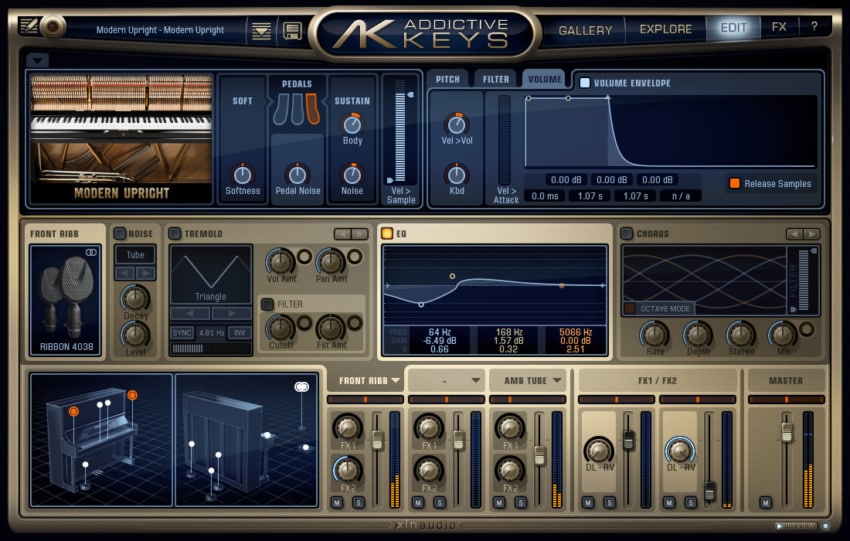
One important thing to note is that you can gain access for free to one of the Addictive Keys plugins by purchasing a Focusrite Scarlett, Clarett, and other Focusrite interfaces.
However, you will only be able to choose one of the pianos, and not all of them.
Even though the Modern Upright Piano plugin is a bit more limited than other plugins on this list, mainly because it only features one piano type, it definitely sounds fantastic and is worth getting if you only need an affordable upright piano sound.
Listen to Modern Upright Piano here;
Find out more about the Modern Upright Piano here.
VSL Vienna Imperial ($332)
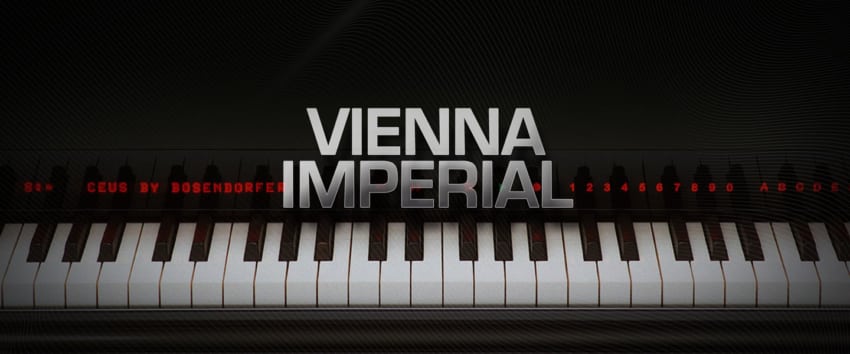
The Vienna Imperial library by VSL is recorded on the Bösendorfer Imperial 290-755, meaning that it has nine extra notes below the lowest A note on traditional pianos, and it’s the largest piano sample library ever created with 1.200 samples per key, providing you with precise sampling detail.
This library is considered to be one of the most realistic ones currently available in the world, and it features pedal-up and pedal-down notes in up to 100 velocities, comprehensive sympathetic resonances, and multiple release samples.
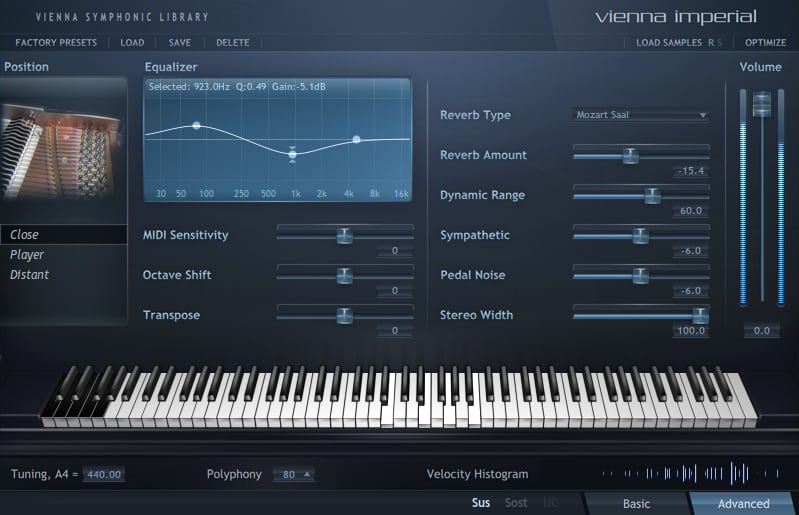
As far as the interface goes, it comes with a Basic View, which lets you choose between three recording positions (close, player, and audience), as well as an Advanced View, which gives you quick and easy access to more control options such as convolution reverb, EQ, pedal noises, sympathetic resonances, stereo width, MIDI sensitivity and more.
This library also lets you choose between different microphone perspectives, including player and audience perspectives, as well as built-in effects such as Reverb and also an EQ.
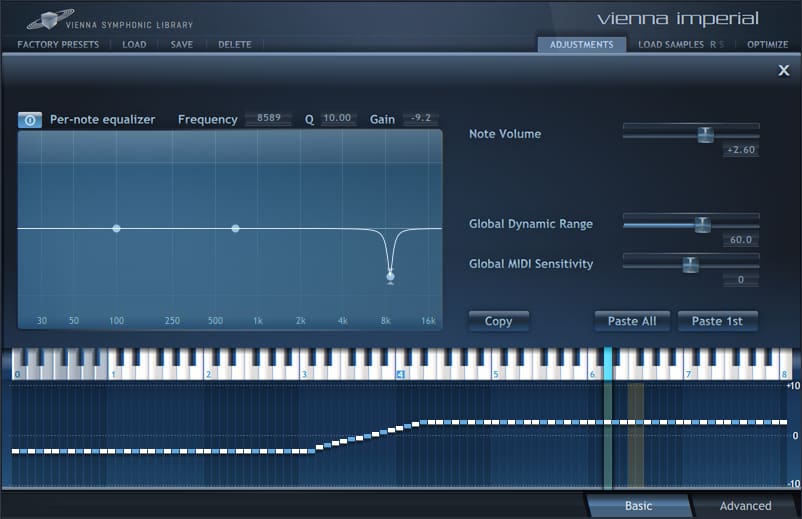
All of this lets you tailor the sound in a very specific way to fit your needs, and this is also why this sample library is probably one of the best ones you can get, even considering the price.
It is also a fantastic sample library to use for orchestral music, contemporary pop, rock and even jazz songs, since it can easily sit within any mix.
The Vienna Imperial library offers a total of 69.663 samples in an 46GB pack, and it works on both Windows and MacOS on 32bit and 64bit systems.
Listen to the VSL Vienna Imperial library here;
Get VSL Vienna Imperial here: Sweetwater.
Synthogy Ivory II Grand Pianos ($349)
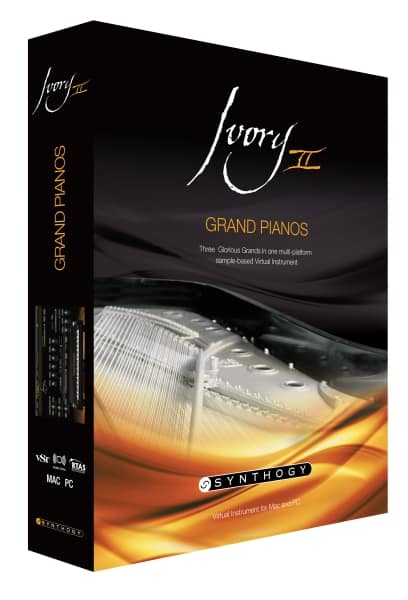
The Ivory II Grand Pianos library features not one, not two, but recordings of three of the greatest pianos to have ever been played on a stage, such as the Bösendorfer 290 Imperial Grand, Steinway D Concert Grand, and the Yamaha C7 Grand.
With over 77GB of samples, 18 velocity layers and harmonic resonance modeling, which creates a more realistic string resonance sound, the pianos on this library sound very smooth and realistic.
Luckily, if you don’t have enough storage to install all three pianos, you can install them individually.
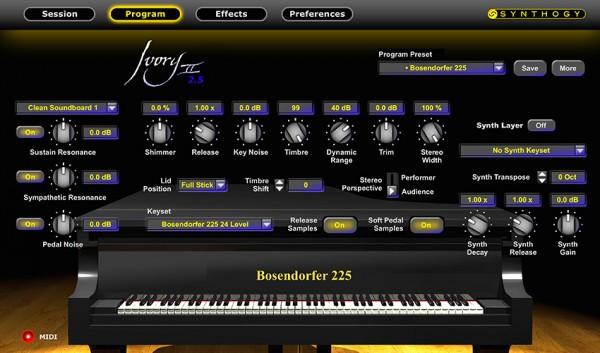
By just taking a quick look at the interface you’ll notice the vast customization that Synthology’s engine offers; FX like Chorus, EQ, Real Ambience, Timbre and stereo width controls, as well as changing the perspective, Velocity response, mechanical noises, and much more.
You can also introduce or completely remove pedal noises as well as adjust the lid position to further adjust the brightness of the sound.
In addition to all the effects and sound adjusting options that this library provides, it also comes with dozens of presets, which will let you instantly scroll through different microphone placements, the reverb types, etc. to hear the pianos in different recording environments without having to manually adjust every setting.
Lastly, this library runs on any major plugin host (Cubase, ProTools, etc.), and works both on Windows and MacOS 32bit and 64bit, and it requires a minimum of 1.5GB of RAM and 22GB of hard drive space with a minimum RPM of 7200.
You can listen to the Ivory II Grand Pianos here;
Find out more about the Ivory II Grand Pianos here; Thomann, Official Website.
Soniccouture Xtended Piano ($169)

What sets Xtended Piano apart from all the plugins ones on this list is that this one is a library of unconventionally played pianos, such as; Plucked, Dampened, Bowed, Played with Mallets others recorded with special effects, like scratching the strings, etc.
This means that the sounds you will get when downloading this library are far different than what you would normally find on any other one.
One interesting feature is the generative arpeggiator, that lets you hold a chord and it will start arpeggiating and evolving.
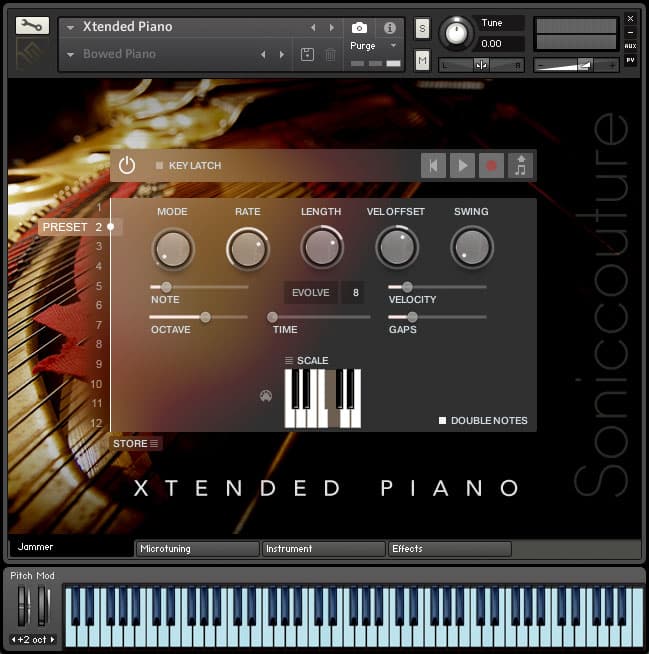
Also, the Plucked Piano has the Strummer control that lets you play a note and when you move the knob up and down it will play the following notes of the chord, and this lets you create great sounding parts by only playing one note at a time.
Xtended Piano is available in VST2 / AU / AAXnative / NKS formats and can be hosted on any major DAWs, both on Windows and MacOS.
Additionally, it works on KONTAKT or KONTAKT Player 5.5 or later, and as a standalone program.
Listen to Xtended Piano here;
Find out more about Xtended Piano here.
Garritan CFX ($199.95)
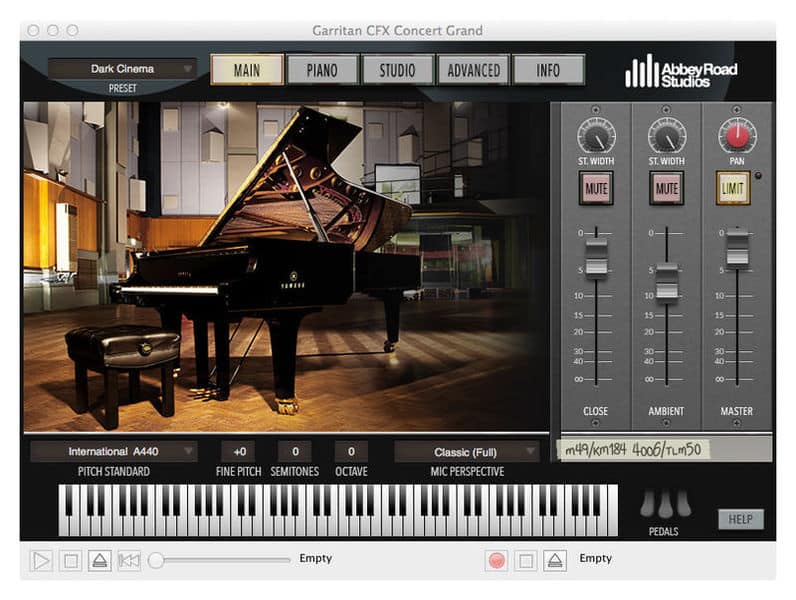
This library features samples of a Yamaha CFX Concert Piano that was recorded and sampled at Abbey Road Studios.
Just like most other libraries on this list, it offers different microphone perspectives; Classic, Contemporary and Player perspectives, and these were recorded using state-of-the-art microphones, such as the Neumann TLM50, DPA4006, AKG C12 & D19, and more.
In addition to this, there are multiple presets included for each of these microphone perspectives that were designed to be useful right from the get-go; from Classic Rock presets, to Cinema presets, and more, and they all need little to no tweaking to sound great!
There are 20 Velocity layers per key, as well as sample sets for pedal up, sustain pedal down, and soft pedaling.
Independent EQ controls for every mic perspective and a multitude of adjustable piano parameters are also included, as well as Reverb, stereo width adjustment, dynamic range control, and more.
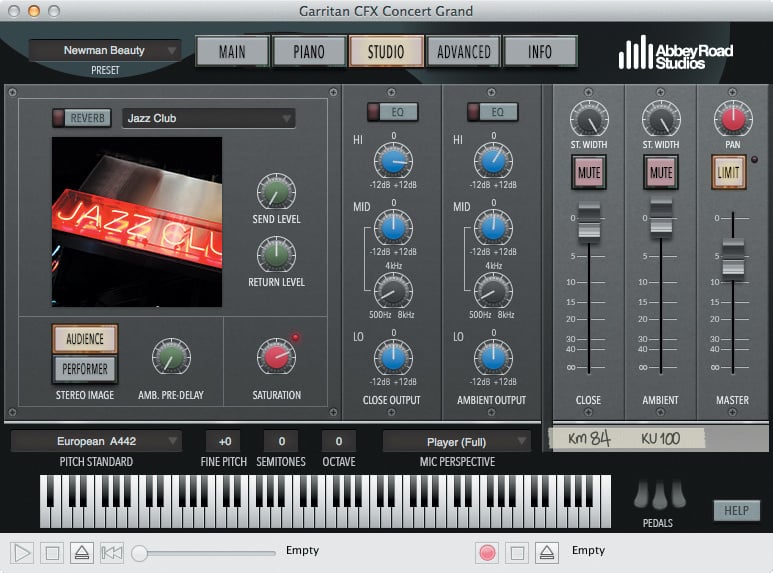
This library is AAX, RTAS, VST, and AU compatible, which means that it will work on both MacOS and Windows on any major DAWs, and since it is powered by the ARIA Player, there is absolutely no need to purchase a separate sampler.
It can even be used as a standalone program.
As far as system requirements go, you will need 133GB of free storage, or 24GB if you go for the compact version, a minimum of 4GB of RAM, and a reasonably powerful processor.
If you want a more affordable version of this library, then get the CFX Lite one for $$79.95; the only difference is that you will only have access to the close mics of the classic perspective.
Listen to Garritan CFX here;
Find out more about the Garritan CFX Piano library here; Thomann, Amazon, Official Website.
Addictive Keys: Studio Grand ($80)
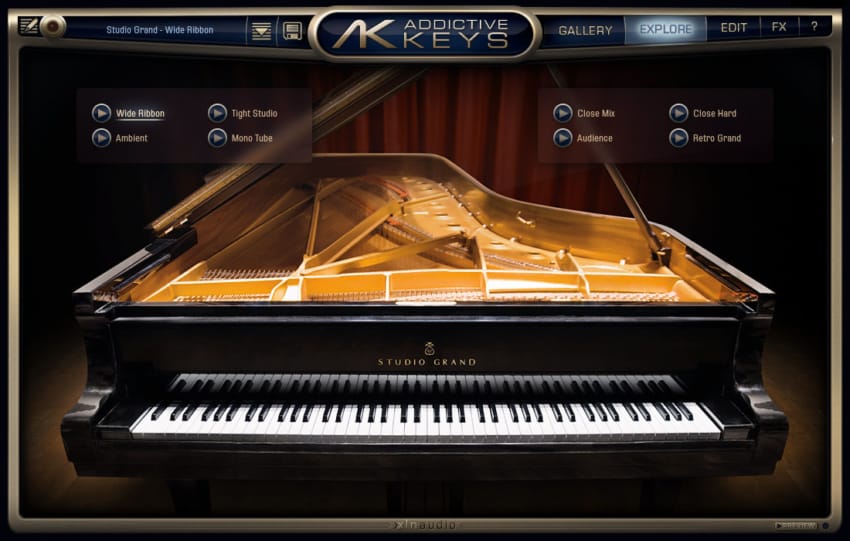
The Studio Grand by Addictive Keys is one of the more affordable grand piano plugin alternatives out there.
It is sampled from the Steinway Model D concert grand piano, which is one of the first choices for many pianists, and is famous for its superb sound.
Despite being sampled from a Steinway piano, it can also sound quite different thanks to all the presets that are included, which can create anything from extremely spacious piano sounds to weird and other-worldly ones.
In addition to this, every sample was recorded using various different microphones, as well as different microphone placements, and you can select whatever combination of microphones and placements you want in order to tailor the sound to your own needs.
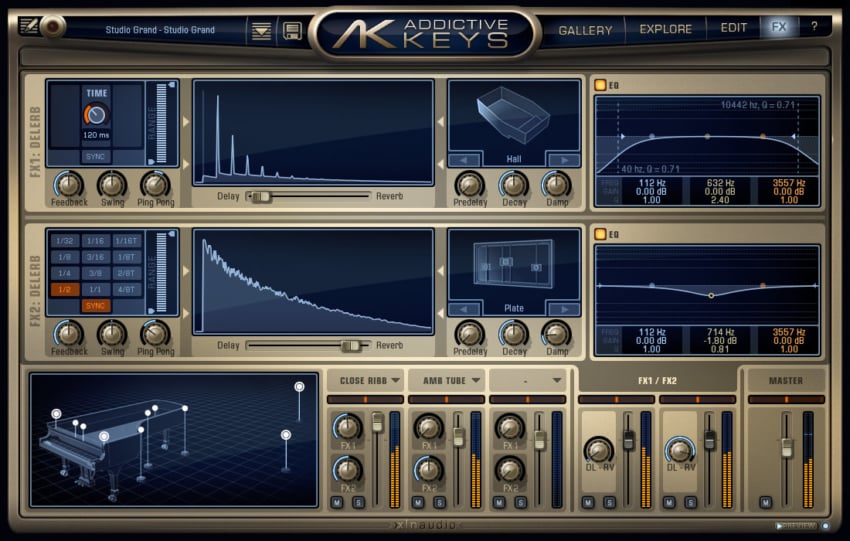
Included also on the FX page are pedal noises, sustain pedal resonances, as well as built-in reverb, delay, EQ and Warmth/brightness controls , which gives you further control over the sound.
One important thing to note is that you can gain access for free to one of the Addictive Keys plugins by purchasing a Focusrite Scarlett, Clarett, and other Focusrite interfaces.
This library is a bit limited compared to other ones on this list; however, considering that it’s quite more affordable as well, it’s definitely worth considering.
Lastly, the Addictive Keys Studio Grand plugin doesn’t need a sampler or any additional software to work; in fact, it works as a standalone plugin both on Windows and MacOS.
Listen to the Studio Grand Piano library here;
Find out more about the Studio Grand Piano here.
Native Instruments Definitive Piano Collection ($199)
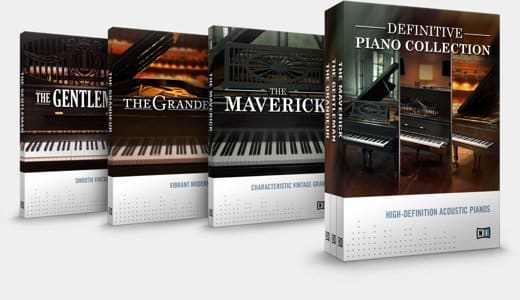
The Definitive Piano Collection by NI is comprised of three different pianos;
The Gentleman, which is a sampled instrument based on an upright piano of 1908 with all of its original parts kept intact. It has a vintage vibe to it and sounds a lot like those old jazz pianos, but not like the old ragtime ones that sounded out of tune.
The Maverick, which is the recreation of a 1905 concert grand and sounds a bit darker and more intimate than most regular concert pianos.
Lastly the Grandeur, which is based on some of the best concert grand pianos and sounds just like you would expect a concert grand to sound.
All three pianos feature 18 velocity layers, half pedal and re-pedal functions as well as adjustable hammer, pedal, and string noises.
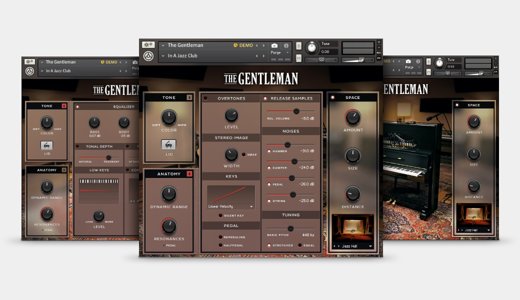
Not only that, but the customizability of the sounds is quite extense since you have control over the tone, the sound of the room, pedal noises, hammer sounds, the dynamic range, lid adjustment to control the brightness, and built-in effects.
Note: All three pianos can be purchased independently, but with the pack you get three for the price of two.
Lastly, these are KONTAKT instruments, which means that you will either need KONTAKT PLAYER, which is the free version, or the pro version of KONTAKT to be able to run them, and you need about 40GB of free storage for all of them.
You can listen to the Definitive Piano Collection here;
Find out more about the Definitive Piano Collection here.
Death Piano ($32)
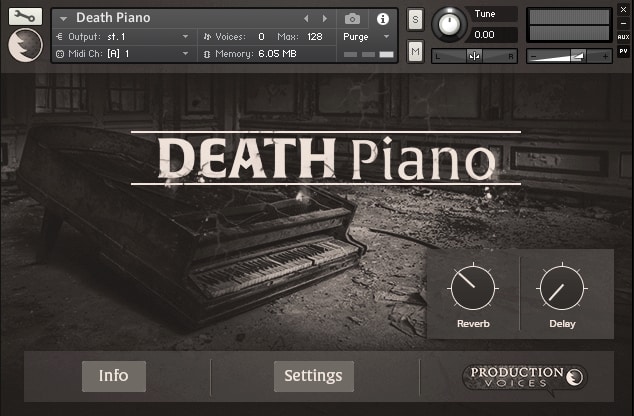
Aside from its dark name, Death Piano, which is based on the Steinway D Concert Grand, sounds absolutely fantastic.
Important note: It’s designed for the full version of KONTAKT, which if you don’t already own, will set you back quite a bit of money.
Death Piano sounds a lot darker than most other libraries, as you would expect, and it can definitely work for film scoring or gaming music.
One feature that I love is that it has reverse samples, and when you play notes and keep the sustain of those notes long enough, after a couple seconds they will play in reverse.
In addition to this, you also get a plucked upright piano sample set and a Parlour piano sample set.
Included are also dozens of presets, but if you want to tailor the sound in a specific way you can do so thanks to the synthesis engine that includes Filter, Envelope and LFO modulations, and you can also add reverb impulse responses.
Death Piano will work in KONTAKT, not KONTAKT PLAYER, and you will need about 1GB of free storage on your hard drive.
Listen to Death Piano here;
Find out more about Death Piano here.
Ravel by Universal Audio (Luna Recording System)
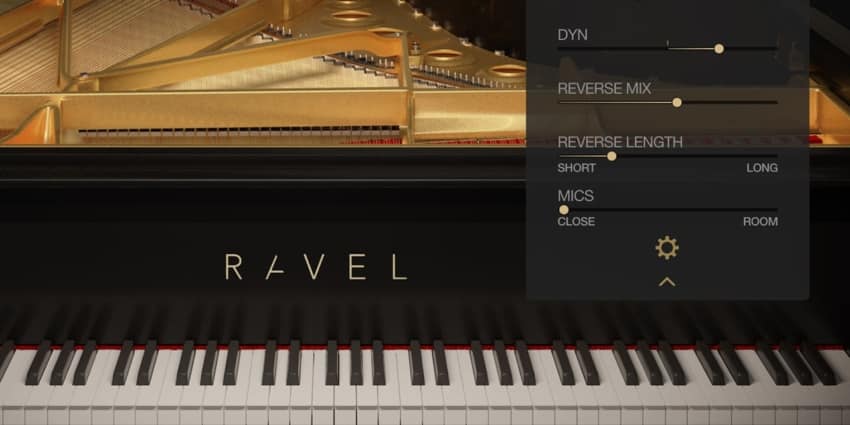
Universal Audio is the company behind the best audio interfaces of all time, the Apollo series, and their Recording System allow capturing audio through DSP‑powered UAD plug‑ins with no discernible latency.
This means that the audio interface is doing all the processing and not your PC, allowing you to play and record with zero latency.
The Ravel is an emulation of a Steinway Model B† grand piano that sounds incredibly realistic; it’s the newest one of all the pianos on this list and I also think that it’s the best one.
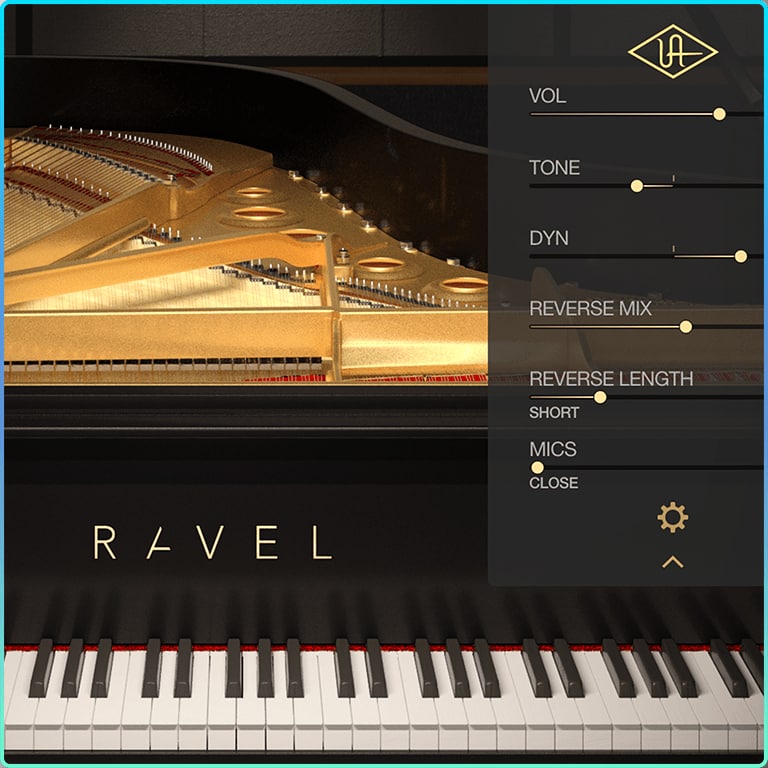
The controls offered are easy to use and allow you to shape the tone in just a matter of seconds. However, the most interesting feature that this piano has to offer is the Reverse Mix.
Here you can choose to play notes in reverse, and depending on how much you dial in, you will be able to only hear the reversed sample or the original one plus the reversed one mixed in.
When mixing the original sample with the reversed one you will be able to hear the original note first, but once you sustain it then the reversed sample will create an amazing swell sound, and this you can achieve by just adjusting one simple parameter.
The LUNA Recording System comes free with these Audio Interfaces, and if you already have one, then you can download it for free on their website.
However, the Ravel piano sells for $299 and I think it’s only worth purchasing if you already own one of these interfaces or if you plan on getting one anyway, since they aren’t affordable at all.
I wrote a couple posts comparing the Apollo Twin MKII series to other interfaces, here are some links to those posts;
You can find out more about the Ravel Piano and the LUNA Recording System here.
Free Piano VST Plugins
None of these free plugins come even close to the premium ones I just listed, but they are definitely worth considering, especially since they are free!
I wrote an entire post about free piano VSTs that you can check out here, but here are the ones that I thought to be the best out of that entire list.
4Front Piano
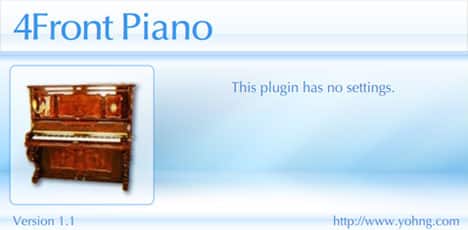
I believe that this plugin is fantastic for anyone who doesn’t know too much about plugins in general since it doesn’t come with any controls; you just load it up, and that’s it!
Despite this lack of customizability, it actually sounds quite good and is extremely light on the CPU.
Download: 4Front Piano.
Versilian Upright No.1
Recorded at the Berklee College of Music and featuring over 250MB of piano sounds, the Upright No. 1 is a clean sampling of an upright piano that sounds quite realistic.
It features 3 different velocity layers and a handful of controls over the dynamics and reverb.
For being a free plugin, it sounds terrific!
Download: Upright No.1 Piano.
Soundmagic Piano One
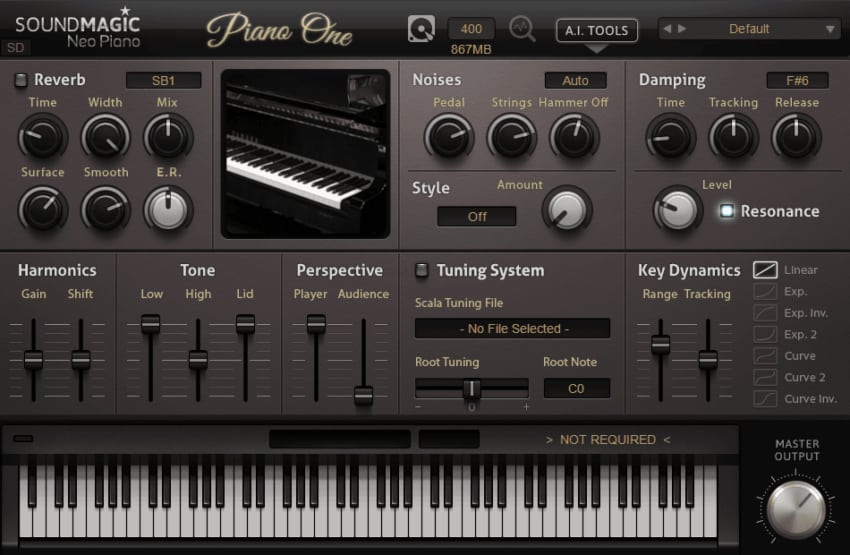
Piano One is a sampled version of the Yamaha C7 concert grand, and it’s the complete opposite of 4Front Piano in the sense that the number of controls available to shape the sound are quite high;
You can tweak the Tone, Harmonics, the perspective, and more, and it definitely sounds fantastic!
Download: Piano One.
There are a lot more free ones available and they all sound pretty damn good, so make sure to check out the post I linked earlier and try them all out!
Why should you use VSTs?
VST instruments offer a much wider variety of sounds than what a digital keyboard can, and if you only use your keyboard then this means that you will be stuck with those built-in sounds until you upgrade to a new one.
By using your digital keyboard as a MIDI controller, either through the MIDI output or via USB, you can trigger those samples in the VST library and play entirely new sounds.
In addition to this, when you record with a digital piano you record audio tracks, and if you need to do subtle corrections to those tracks, then it will either take a lot of time or you will have to re-record the entire thing.
When you record MIDI, you can simply move the notes around in the Piano Roll, be it to adjust the pitch, timing, and more, and any mistake can be corrected in a matter of seconds.
Using the right Equipment
In order to be able to use Piano VSTs you’ll need the following:
A digital piano or MIDI controller that either comes with a traditional MIDI- or USB connection, a computer, a DAW or any other recording software that can host VSTs, and speakers or headphones.
I wrote a couple posts where you will find information on all these things I listed, so make sure to read them as well.
What is a Piano VST?
Piano Virtual Studio Technology (VST) is a software that emulates a piano.
You just need a MIDI controller keyboard, 88 keys like that on a real piano to play like you would on an actual piano is the ideal way to go.
There’s no piano hardware involved and the sound is generated digitally through the software.
VSTs can be hosted on all major DAWs (Digital Audio Workstation), like ProTools, Cubase, Ableton, etc.
These VST libraries are created by audio engineers who record real pianos in a studio by recording every single note multiple times with different velocities, different microphone placements, and more.
This is also known as sampling, meaning that samples are created from real sounds.
How to use a Piano VST?
You will need a computer and a program that can work as a host for the piano VST plugin, such as a DAW (Digital Audio Interface), as well as a MIDI keyboard that will be used to send signals to the DAW to trigger the piano samples.
Keep in mind that MIDI doesn’t generate sound, but rather works by sending a signal to the DAW every time you press a key, effectively triggering the respective notes.
Note: The sound will be played back through the computer’s sound system and not through the keyboard’s speakers.
Digital piano vs VST
Digital Pianos/keyboards create the sound from the hardware that is installed in them and reproduce them through speakers or a headphone output.
VST (Virtual Studio Technology) is a software that emulates a piano in your computer and it can be triggered through MIDI via a MIDI or USB connection, or directly from the DAW.
Why use VSTs instead of an Electronic Keyboard?
The advantages of using Piano VST libraries instead of the built-in sounds of a keyboard are many; however, this depends mainly on your personal needs.
VSTs are more affordable: Even the expensive VST libraries plus a MIDI controller tend to be more affordable than an electronic keyboard.
VSTs tend to sound better: Especially when compared to more affordable keyboards, VSTs sound a lot better because they use high quality piano samples recorded in high-end studios, plus they feature a lot more customizations, like effects, pedal noises, a lot more velocity layers, etc.
Usable without a keyboard: Should you need to, you can trigger the notes directly in the piano roll in your DAW.
Modeled Vs Sampled Piano
A sampled piano is comprised of the recordings of real and legendary pianos, meaning that when you play a note from that piano VST library you’re actually reproducing a sound that has been recorded off of a real piano.
Modeled pianos, on the other hand, are created synthetically and the sounds are not as realistic; in fact, they can even sound extremely different to how a real piano would sound like.
The advantage of sampled piano libraries is that you get access to the sound of legendary pianos right there in your DAW.
The disadvantage however, is that you have less ways of customizing the sound, and if you only downloaded one library, say an upright piano one, then you can only reproduce that specific sound.
The advantages of modeled pianos are that you can customize and tweak the sounds a lot more, plus they tend to need a lot less free storage space on your hard drive.
Like I mentioned earlier, the disadvantages or modeled pianos is that they tend not to sound realistic.
Can I hear Piano VSTs on my keyboard’s speakers?
No.
A Piano VST is hosted in a DAW in your computer and reproduced through the sound system connected to that computer, and while you can play those sounds from a keyboard, the keyboard itself can only reproduce the sounds it already has built-in.
Conclusion
Piano VSTs area great way of creating music without the need of purchasing expensive equipment; all you need is a computer, a VST library and a MIDI controller, which in many cases isn’t even necessary.
I believe that anyone should have a couple different piano VSTs at their disposal, be it free or premium ones.
If the free plugins don’t cut it and you need affordable yet great sounding ones, then I absolutely recommend Death Piano and either Addictive Keys: Studio Grand or Addictive Keys: Modern Upright since they sell for about $80 each.
Have a wonderful day!
